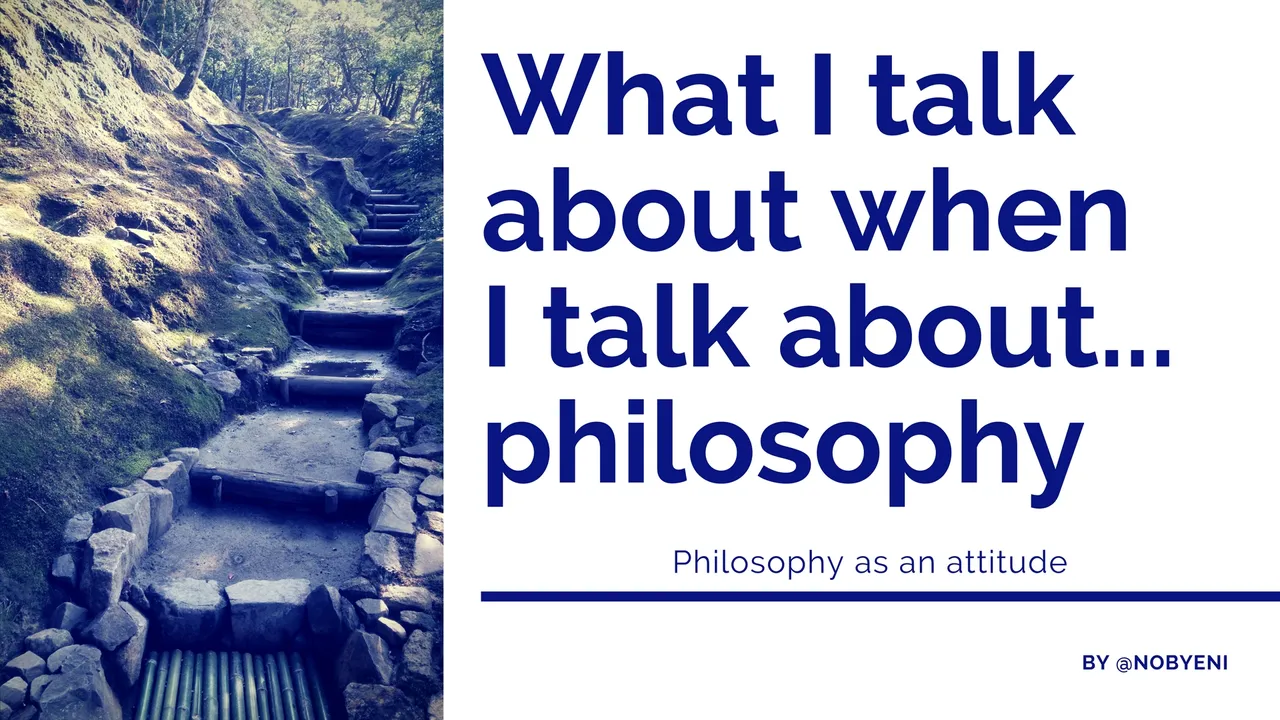Granted, I talk about it often. But that is because philosophy is more than just my profession. It is my life, something that is a part of me. That might sound weird, but maybe that’s because I have a very specific idea about what philosophy is. And as there are so many definitions about what philosophy is, saying that I cannot but be a philosopher might very well be confusing. Not in the least for people with a different definition. So, in this post I’ll try to clarify why being a philosopher is inevitable to me.

Loving wisdom
Pretty much every philosophy book you’ll read, will start out with defining philosophy. It’s one of the oldest intellectual occupations, but still it remains necessary to redefine it. (Maybe this is why it remains also something weird and confusing to people?) The most common definition you will find is something attributed to Socrates, even though there is no surviving written document by Socrates; Philosophy as the love for wisdom. And even though this might seem a good fit, and etymologically sound, there are at least two problems with this definition.
First, this presupposes there is something like ‘wisdom’. Wisdom as opposed to what, stupidity? Is wisdom truly something that exists, something out there that we can search for? What does this mean for the ontological structure already presupposed in the idea of philosophy? Is wisdom something we can aim for, isn’t it more of a side product? Is it even an object we can long for, or is wisdom something else? And does this mean that philosophy cannot be about stupidity? Or does it mean that we can decide what is wisdom and what is not, are there any rules we can learn? Can we go to a wise person and ask them to give us some of their wisdom?
Secondly, philosophy as a type of love creates some distinct problems. When philosophy is reduced to a kind of desire, how then do we deal with the fact that loving brings about a lot of unwanted side-effects. Blindness, hormones. Desire and love are processes in which a subject tried to get closer to an object. Tries to envelop, obtain, possess an object. But this wanting, this desire, taints that object as well. Wisdom is no longer an object in itself, but has become an object that can only exist in relation to the subject. Or, in other words: the philosopher wants to obtain wisdom for his own sake, not for the sake of wisdom.
Philosophy as an attitude
Instead of considering philosophy to be a method of reaching some goal, like wisdom, I prefer to understand philosophy as an attitude. An attitude is a way of being and should thus be distinguished from a method. Being is a state, something you practise continuously, and which never ends. It is a ‘way’, and not an ‘end’.
This is hardly a new idea. We can find it already clearly in the Tao Te Ching…
Hence,
The sage focuses on non-action in his works,
Practices not-saying in his speech,
The myriad things arise but are disregarded
The sage produces but does not own
Acts but does not claim
Accomplishes work but does not focus on it
Does not focus on it, and thus it does not go.~ Tao Te Ching, Chapter 2 translated by Wikisource.
But it is an approach to philosophy that is not often shared. Philosophy is often considered to be a method to find good arguments or the study of logic. I’ve even met people who call themselves philosophers who want to prove things, make things measurable. (And yes, I’m talking about ‘famous’ philosophers here, although I’ll not name names.) To me that is an absurd definition of philosophy.
Philosophy is a search, an inner search for something that remains unknown. The moment we know it, it stops being what we are looking for. This is what makes the search both valuable and continuous. And it is not wisdom that we search for, long for, as that is a state of mind, a judgement about how something is applied. Instead it is Truth, the Real. It is something unknown to us, that we grasp for. Truth, which cannot be found for once we do, it slips through our fingers. And yes, Meno's paradox hits us right in the face - but let's save that paradox for later.
Perhaps it's best to go back to the Tao, where all of this was already said, but much clearer:
If everybody knows what beauty is,
then beauty is not beauty [anymore];
If everybody knows what goodness is,
then goodness is not goodness [anymore].~ Tao Te Ching, Chapter 2 translated by Wikisource.
But this is not solely an Eastern understanding of philosophy. We can find the traces of it in the roots of Western philosophy as well. Philosophy as a spiritual exercise instead of a method to make distinctions. Even though the focus on distinctions and judgment has gotten much more attention throughout the history of Western philosophy. The idea of dualism is firmly rooted in a Western (or male?) understanding of philosophy, which can be traced back to not only Hegel and Descartes, and even all the way to Pythagoras, who outlined dualism in his Table of Opposites.
Philosophy as a way of life
Philosophy cannot be distinguished from life itself. Not for me, at least. There is no way of shutting philosophy off. It’s not possible to halt the search for truth, the attitude towards life and myself that is fundamental to who I am. This doesn’t mean I’m always going about thinking “What would Deleuze have thought about this?” But it does make me observe silence and ponder something before I jump in to have an opinion about something. It does make it possible for me to both say something with absolute conviction and change my focus and direction some minutes later in response to input that I hadn’t considered before. I does make me question assumptions before understanding something.
When I talk about philosophy, I am talking about something so dear to me, as my own life. Philosophy is as close to who I am, as breathing is for my body. It is an attitude that has developed over time and something that continues to grow and change. That makes it so much fun, and frustrating as well. Although perhaps more frustrating for the people around me, than for myself.
Disclaimer: This post is a reflection of my present understanding. It in no way is to be considered as a limit on my future views. Philosophy as I aim to practise it, is to strive to break one's understanding of the world and incorporate the new void into your future self, who is nothing but present in the present.
